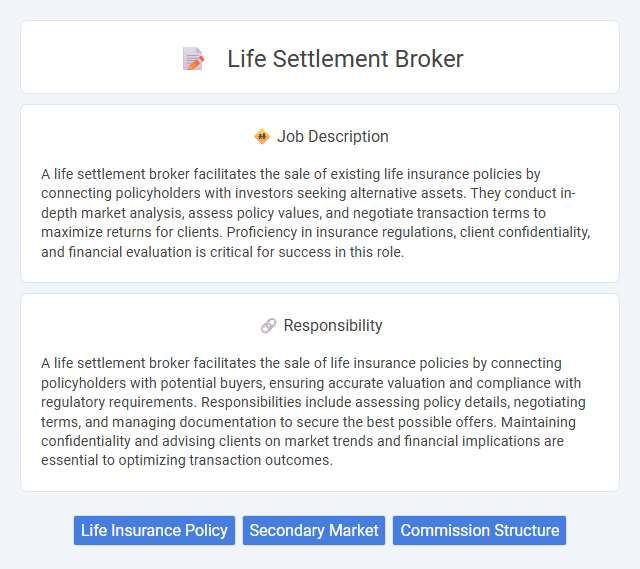
A life settlement broker facilitates the sale of existing life insurance policies by connecting policyholders with investors seeking alternative assets. They conduct in-depth market analysis, assess policy values, and negotiate transaction terms to maximize returns for clients. Proficiency in insurance regulations, client confidentiality, and financial evaluation is critical for success in this role.
Individuals with strong communication skills and a background in finance or insurance may be well-suited for a life settlement broker role, as the job requires explaining complex policy details to clients. Those who are comfortable working in a fast-paced environment and handling sensitive conversations about life insurance policies might find this career fitting. People who prefer structured routines or dislike negotiating could find the demands of this position challenging.
Qualification
Life settlement brokers are required to hold a valid state insurance license, typically obtained through passing a comprehensive exam that covers life insurance law and ethics. Strong knowledge of financial products, client needs assessment, and risk analysis is essential to effectively negotiate and secure optimal settlement offers for clients. Professional certifications such as Chartered Life Underwriter (CLU) or Certified Financial Planner (CFP) enhance credibility and expertise in this specialized market.
Responsibility
A life settlement broker facilitates the sale of life insurance policies by connecting policyholders with potential buyers, ensuring accurate valuation and compliance with regulatory requirements. Responsibilities include assessing policy details, negotiating terms, and managing documentation to secure the best possible offers. Maintaining confidentiality and advising clients on market trends and financial implications are essential to optimizing transaction outcomes.
Benefit
A life settlement broker likely offers considerable financial benefits by helping policyholders sell their life insurance policies for more than the cash surrender value. They probably facilitate access to better market offers, increasing the chances of higher returns. Clients may also experience reduced administrative burdens, as brokers often manage complex transactions and negotiations.
Challenge
Life settlement brokers likely face the challenge of accurately assessing policy values in a fluctuating market, which can impact deal profitability. Navigating complex regulatory environments may complicate transaction processes and require ongoing compliance efforts. Building trust with both policyholders and investors probably demands strong communication skills and a deep understanding of client needs.
Career Advancement
A life settlement broker facilitates the sale of life insurance policies, connecting policyholders with potential investors to maximize policy value. Career advancement in this field often involves gaining expertise in insurance regulations, financial analysis, and client negotiation, leading to roles such as senior broker, compliance officer, or investment analyst. Developing a strong network within insurance, finance, and legal sectors enhances opportunities for leadership positions and specialized consulting roles.
Key Terms
Life Insurance Policy
A life settlement broker specializes in facilitating the sale of existing life insurance policies to third-party investors, providing policyholders with an alternative liquidity option. They assess the policyholder's life insurance policy, determine its market value, and connect sellers with buyers seeking investment opportunities in life insurance portfolios. Expertise in regulatory compliance, valuation techniques, and market trends is essential for maximizing policyholder returns in the life settlement market.
Secondary Market
Life settlement brokers facilitate transactions between policyholders and investors in the secondary market for life insurance policies, ensuring optimal value for sellers looking to liquidate their policies. They analyze policy terms, evaluate market conditions, and connect sellers with multiple buyers to maximize sale proceeds. Expertise in regulatory compliance and contract negotiation is essential to secure transparent and profitable deals in this specialized financial market.
Commission Structure
Life settlement brokers typically earn commissions based on a percentage of the policy's sale value, often ranging from 3% to 8%. Commission structures may include upfront fees upon closing the transaction and residual commissions if the life settlement company receives ongoing payments. Brokers with strong networks and experience can negotiate higher commission rates, maximizing their earnings in the growing life settlement market.
 kuljobs.com
kuljobs.com